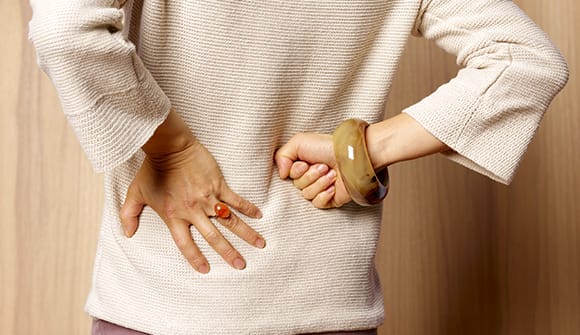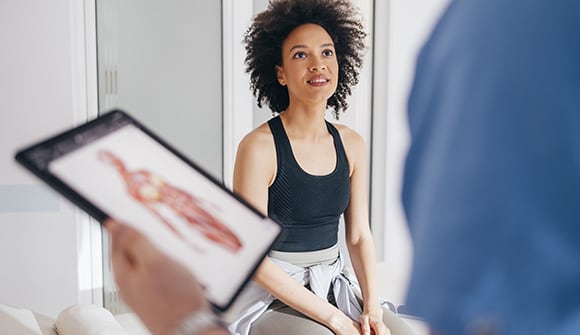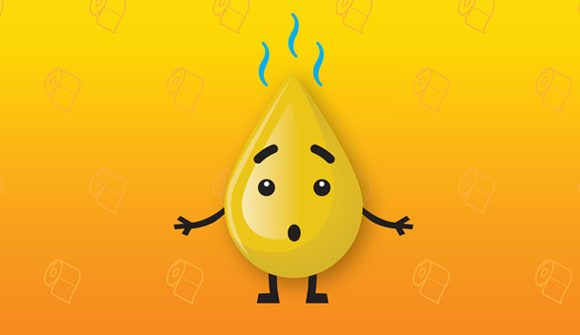Unexplained back pain?
Common signs of kidney stones and what to do next.
Article Author: Katie McPherson
Article Date:

Your back is hurting again, and you’ve been feeling nauseous and feverish off and on for a few days now. Maybe it’s the flu? Or some weird stomach bug? It may come as a surprise, but these are actually classic signs of a kidney stone.
About 10% of Americans will suffer this ailment in their lifetime. And, after creating one stone, the body is 50% more likely to do it again. So, how can you avoid kidney stones for the first (or second) time? What exactly is a stone, and what happens if you get one anyway?
They’re often caused by what we eat.
Kidney stones are created when there’s a surplus of certain chemical compounds in the urine. These come from foods we eat, especially if we consume certain kinds in excess.
For example, oxalate is a naturally occurring compound in plants. It can bind to calcium inside the body, crystallize and turn into a kidney stone when those crystals clump together. People who consume diets high in nuts, leafy greens, chocolate and tea may be at increased risk for these types of stones because these foods contain high levels of oxalate.
“I don’t tell my patients not to eat these foods,” said Lael Stieglitz, MD, a urologist at Baptist MD Anderson Cancer Center who also treats patients without cancer for general urologic conditions, including kidney stones. “It’s about eating them in moderation as part of a well-balanced diet.”
Each person’s metabolism functions differently, so two people may have stones made of totally different materials. They can also vary widely in size, from as small as a grain of sand to larger than a golf ball.
They definitely don’t feel good.
The larger a kidney stone gets, the more noticeable it becomes. When it becomes big enough to irritate or even cause blockages in the kidney, the pain came become intense.
Dr. Stieglitz added that some stones can actually get too big to hurt.
“This may sound confusing, but kidney stones hurt when they move. Some patients have stones bigger than golf balls that don’t cause any pain because they can’t move, but they can cause permanent kidney damage and are very important to treat,” she explained.
Symptoms of kidney stones include:
- Severe pain on either side of your upper back
- Bloody, cloudy or unusual smelling urine
- Persistent stomachache
- Nausea or vomiting
Dr. Stieglitz said if any of these symptoms happen along with a fever or chills, you should see a doctor right away.
“If a kidney stone is on the move and causing a blockage, and the urine being blocked gets infected, this can be a major medical emergency,” she said. “Stones plus infection can lead to sepsis and even death.”
If your doctor determines the stone is small enough to pass without damaging your kidneys, the only treatment you may need is a pain reliever. In more severe cases, it may need to be surgically removed.
They’re preventable with a little effort (and the right help).
Prevention starts with staying hydrated. Drinking six to eight glasses of water a day isn’t just an old wives’ tale – it helps keep kidney stones at bay.
Dr. Stieglitz said preventing kidney stones depends on the type your body makes. She runs the Metabolic Stone Clinic at Baptist Health, which determines the materials that make up a patient’s kidney stones. For those interested in prevention, stones are analyzed after the patient brings them from home or has them surgically removed. The analysis also includes a 24-hour urine collection period, which the patient can do at home, and simple blood tests.
“Depending on what kind of stone you make, there are different ways to decrease your risk or prevent the formation of future stones,” Dr. Stieglitz said. “Going to a clinic that analyzes the building blocks of your stones is a way to be proactive and take charge of your own health.”
Dr. Stieglitz said fish oil and highly acidic or basic substances, such as lemon juice or baking soda, can help to prevent the formation of kidney stones by decreasing calcium and oxalate levels.
A specialist can also prescribe medication to help prevent stones from forming or perform surgery to remove them if needed, in addition to monitoring kidney stones annually with noninvasive ultrasounds.
“There are so many options out there to reduce your risk of kidney stones or treat them if needed,” Dr. Stieglitz said. “I want patients to know they have options, and that kidney stones are more common than they think.”
If you're concerned you may have kidney stones, or want to learn more about why yours form, call Baptist MD Anderson Cancer Center at 1.844.632.2278 and request an appointment with the Metabolic Stone Clinic. You can also submit an appointment request online.



